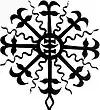Māra
Māra is the highest-ranking goddess in Latvian mythology, the ancient Dawn-goddess, previously called Austra,[1] and,[2] not at all, although often stated, the same as Zemes māte (Mother Earth, pace).[3]
| Part of a series on |
| Baltic religion |
|---|
 |
Names
Alternative names: Māre, Mārīte (diminutive), Mārša, Māršava (Western Latvia).
Description
She is the patroness of all feminine duties (children, cattle), patroness of all the economic activities ("God made the table, Māra made the bread"), even money and markets. Being the alternate side of Dievs, she takes a person's body after their death while Dievs is taking the soul. She is the goddess of the land, which is called Māras zeme (Māra's land). She is called 'Mother of Cows' – Govu māte – the same way the Vedic Dawn-goddess is called gávām mātár-.
In western Latvia, and to a lesser degree in the rest of Latvia, she was strongly associated with Laima, and may have been considered the same deity.
Festivals
The festival Māras was held in her honor every August 15. This is probably a result of Christian influence and identification of Māra with Mary, whose main festival (the Assumption) has fallen on the same date since early times. Opinions are divided over whether Māra is a pre-Christian deity,[4] or originated as a reflection of the Christian Mary created by semi-Christian Livonian peasants.
References
- Didier Calin
- Calin, Didier (January 1996). "Indo-European Poetics and the Latvian Folk Songs".
- Janis Paliepa, The Origin of the Baltic and Vedic Languages: Baltic Mythology
- "Latvian folklore: Māra". Archived from the original on January 26, 2009. Retrieved 2012-11-23.
{{cite web}}: CS1 maint: bot: original URL status unknown (link) (in Latvian)
External links
- Māre at Krisjanis Barons folk closet, Latvian Folklore (in Latvian)
- Latvia seeks common roots in Tamil Goddess Mariamma , Times of India